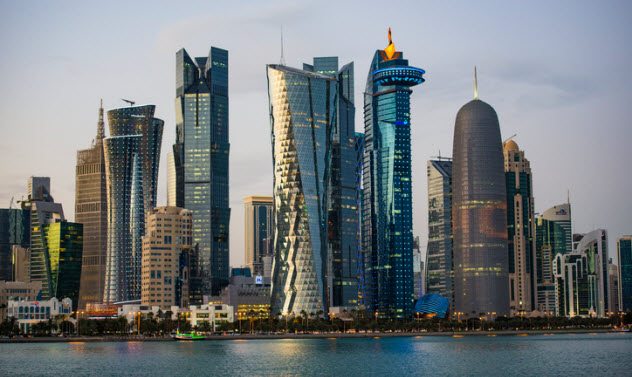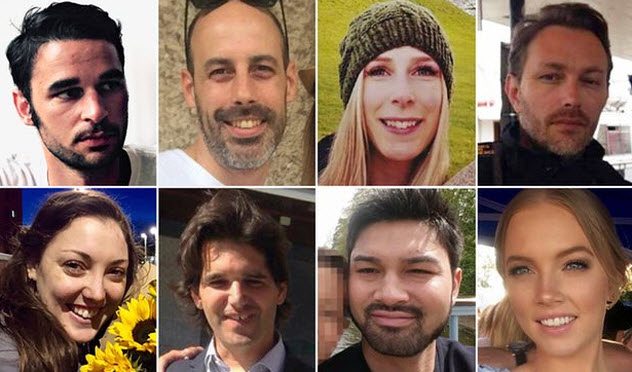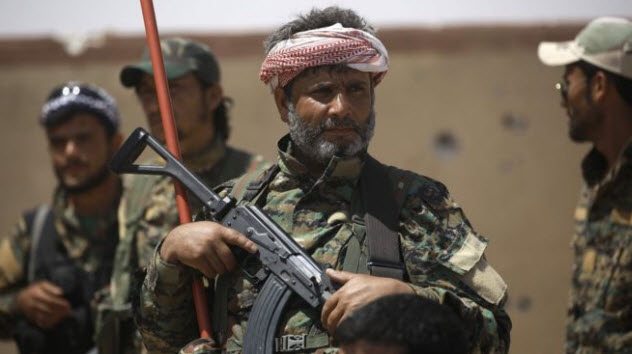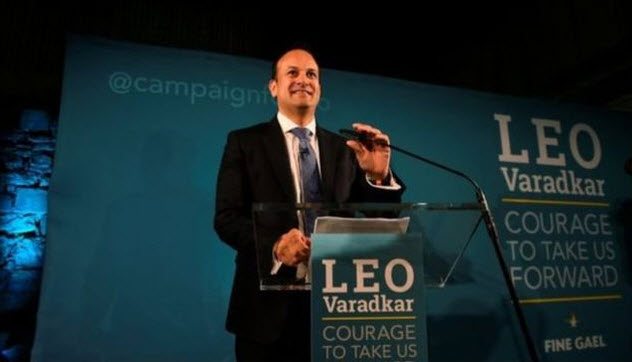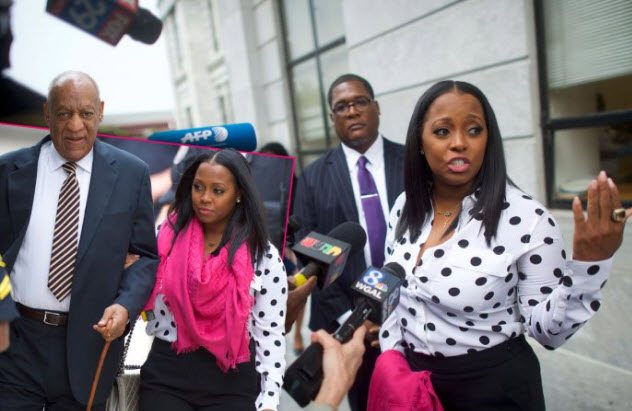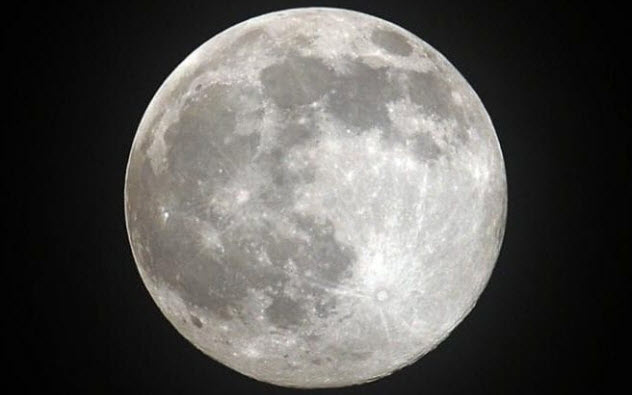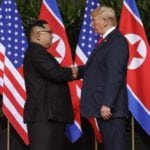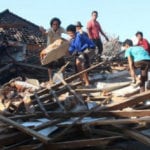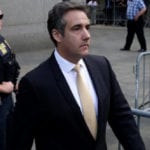There were so many over the last seven days that we’ve had to let a couple go by the wayside—such as the UK election, which we’ll cover next week when the dust has settled and the final results are in. In the meantime, here are the 10 stories that rocked the world since our last roundup.
10 A Crisis In Qatar Threatened The Entire Persian Gulf
If you’re concerned about Russian hacking in the US, be glad you don’t live in Qatar. Last week, the tiny Arab monarchy’s state news channel put out a string of pro-Iran stories. Qatar is surrounded by Sunni Muslim states that consider Iran in the same terms we used to consider Stalin’s USSR. The backlash was immediate. Five countries (later revised up to nine) cut all ties with Qatar and instituted a devastating economic blockade. This alone would be newsworthy. But the truly scary twist came when the FBI looked into it. They concluded that the offensive news stories had been planted by Russian hackers.[1] The hackers were freelancers, working without Moscow’s knowledge at the behest of one of the states doing the blockading (likely Saudi Arabia or the UAE). The stories were a pretext for the Saudis and others to take on their pro-Iran neighbor, and it worked like a dream. The Gulf is now facing its worst crisis in decades. As an added complication, the US is allied with both states and desperately needs Qatar in the fight against ISIS. Driving a wedge between the US, Qatar, and the Saudis would be the caliphate’s dream come true.
9 There Was Terrorism In London, Manila, Tehran, And Melbourne
- That’s the number of terrorism-related deaths ISIS has claimed this week (not including those in actual war zones). Each attack was the group’s usual mixture of cynical, shocking, and heartbreakingly tragic. First, a gunman walked into a casino in the Philippine capital, Manila, started a fire, and shot those fleeing. Thirty-seven died, mostly from smoke inhalation. While there’s some doubt about his motives—Manila police say it was a botched robbery—ISIS claimed responsibility, and the attack fits their MO. There were no such ambiguities in London. Three men wearing fake suicide vests plowed a van into people on London Bridge, leaped out, and started stabbing patrons of nearby pubs. They managed to kill eight before police shot them dead. So disgusting was the violence that London’s imams refused to perform Islamic funeral rites for the killers. On the other side of the world, an ISIS-inspired gunman took a woman hostage in a Melbourne apartment block, killing one other person. But it was Tehran where the world’s attention focused. ISIS bombers attacked Iran’s parliament and the shrine of Ayatollah Khomeini, an Iranian symbol as potent as the Lincoln memorial. Iran has blamed Saudi Arabia and vowed retaliation, adding fuel to the fire of the Qatar crisis. After all that carnage, you’d think the world would show a little empathy to all those affected. Not quite. Our “soulless jerks of the week” award goes to the Saudi soccer players in Adelaide who refused to stop laughing and warming up during a minute’s silence for the victims in London and Melbourne.[2]
8 The Liberation Of ISIS’s Last Syrian Stronghold Began
When ISIS kills civilians in foreign countries, it usually means one thing. Their caliphate is taking a well-deserved hammering in Iraq and Syria. This week was no exception. As their jihadists unleashed carnage on four continents, Kurdish and Syrian Democratic Forces (SDF) troops were marching toward the city of Raqqa in eastern Syria. Their goal: to smash the caliphate’s capital and destroy ISIS’s hold on Syria. Raqqa is essentially the terrorist group’s last stronghold. While they still hold two other sizable cities, none has the strategic or symbolic importance of the caliphate’s self-declared capital. Flushing ISIS out would mean the end of them as a significant force in the Syrian conflict, leaving them broken and on the run. As such, don’t expect this to be easy. Initial estimates suggest that Raqqa will be harder to take than Mosul, with sadly even more civilian casualties.[3] Unfortunately, the end of Raqqa won’t mean the end of ISIS. When their caliphate collapses, experts think they’ll turn to launching even more attacks worldwide. For what it’s worth, each new atrocity means their cancerous ideology is only coming closer to being wiped out, an eventuality that can’t come soon enough.
7 Ireland Got Its First Gay Prime Minister
Stepping away from the world of terrorism and the Middle East, a piece of historic news came from the Emerald Isle this week. On June 3, Ireland’s ruling Fine Gael party held an election to replace Enda Kenny, who recently stepped down as taoiseach (prime minister). The winner was 38-year-old Leo Varadkar. When he takes up his post next week, he will become both Ireland’s youngest PM and its first openly gay leader. From a historical perspective, this is momentous. Ireland is probably second only to Vatican City as the most staunchly Catholic country in Europe. Homosexuality wasn’t legalized until 1993. To have the gay, half-Indian son of immigrants leading the country is such a dramatic turnaround that you’d be forgiven for thinking this was all a dream some utopian liberal was having.[4] Despite Varadkar’s ticking all the progressive boxes, it’d be a mistake to assume he was a left-winger. Fine Gael is Ireland’s biggest conservative party, and Varadkar is a proud supporter of free markets and the pro-life movement.
6 The Bill Cosby Rape Trial Began
It’s hard to think of an American celebrity who has had a greater fall from grace than Bill Cosby. Once considered a kindly uncle figure to the whole nation, he’s now the target of over 60 complaints of sexual assault and rape. When the accusations first surfaced, the statute of limitations had expired and Cosby was never proven guilty or innocent in a court of law. This week, that changed. After a more recent case surfaced, Cosby was finally put in the dock for three counts of assault. If convicted, he faces a potential maximum sentence of 30 years.[5] The allegations themselves are grotesque, involving the drugging and raping of women. However, we don’t want to pass judgment until the case has been heard and Cosby is either sentenced or acquitted. Whatever happens, though, there’s no denying that one of America’s brightest stars has now been permanently tarnished and a pioneering black actor’s reputation (fairly or unfairly) has been ruined.
5 China Began Preparations To Put A Man On The Moon
When Neil Armstrong set foot on the Moon in 1969, China was an economically backward communist dystopia in the grip of a bloody Cultural Revolution. If you were taking bets that day on the second nation to put a man on the Moon, China would have ranked somewhere around the tiny Pacific island state of Nauru. Which just goes to show that time makes fools of us all. This week, China officially began preparations for a manned Moon landing using Chinese rockets, Chinese technology, and Chinese grit. Although the launch isn’t due until after 2030, the lack of other planned missions means the Middle Kingdom will almost certainly be the second nation to put a man on the Moon. China has been racing ahead on space exploration in recent years. In 2003, it became only the third nation ever to put a man in orbit using its own rockets, and in 2013, the third to land a rover on the Moon. While China’s space agency is still way behind NASA or even private actors like SpaceX, its power and prestige is growing exponentially.[6]
4 Japan Caught Its Longest-Running Fugitive
In 1971, the Japan Revolutionary Communist League staged a violent, anti-American protest in Shibuya Ward, Tokyo. Masaaki Osaka was one of those involved in the riot. The then-student used a pipe to bludgeon a police officer before setting him on fire with a Molotov cocktail. The 21-year-old officer died of his wounds. Osaka vanished into the night, leaving no trace behind. For the last 45 years, his face has appeared on wanted posters across the nation but the fugitive was never found. Until now. This week, Japanese police arrested an old man in Hiroshima on a misdemeanor charge. When they took him to the station, they realized he was the long-missing Osaka.[7] Japan’s statute of limitations for murder was abolished in 2010. As a result, Osaka will now be tried for the killing from half a century ago, a crime that still carries the death penalty in Japan. His arrest ends one of the longest manhunts in Japanese, and perhaps world, history.
3 Russia Was Rocked By A Horrific Mass Shooting
Russia has more mass shootings than the USA. That fact alone should tell you how numbed the country has become to gun massacres. Yet even among such carnage, there still occasionally comes a shooting that could sicken even those used to such senseless violence. This week, such a massacre occurred in the Moscow region. After an argument over his drunkenness, a 45-year-old man left a family barbecue and returned with a rifle. He ordered those present to apologize for offending him. When they refused, he murdered them. In total, nine people died—a grim number, but it’s the details that make it truly horrific. The gunman beat his victims with the butt of his weapon and then shot them through the heads to ensure they died.[8] One of the victims was a grandmother in her nineties. He forced another to dig her own grave. He then attempted to find and murder another family he knew. But thankfully, he was too drunk to find the right house. Had this not been the case, the death toll could have been even higher.
2 The US-Russia Leaks Became A Tsunami
Well, here we are again. Discussing Russia and leaks. One day, we might manage to write a news roundup without including it but likely not for a while yet. Especially when the endless flood of leaks is becoming an all-consuming tsunami. The big revelation this week came when The Intercept published top secret NSA documents showing the Russian military had tried to hack local election officials just before the US election. The report identified voter registration processes that were targeted, but didn’t say that the votes themselves had been manipulated. What it did do, though, was lay the blame firmly at Moscow’s feet. This story was immediately followed by the second-biggest of the week as the person who allegedly leaked the documents to The Intercept—25-year-old Air Force veteran Reality Winner—was arrested in Georgia.[9] But there was more to come. Before the week was out, further leaks were claiming that President Trump tried to get the head of the NSA, Michael Rogers, to lean on then–FBI director James Comey to drop an investigation into disgraced general Michael Flynn. (Rogers denies this version of events.) Another leak said that Attorney General Jeff Sessions had offered his resignation—and been refused—after President Trump blew up at him for recusing himself from the Russia investigation. And we haven’t even touched on the headline Russia story this week.
1 James Comey Testified
The testimony of former FBI Director James Comey before Congress was already generating waves of coverage before it even happened. There were rumors that Comey was going to drop a bomb that could lead to Trump’s impeachment and counter rumors that he was going to completely absolve Trump and his team of anything to do with Russia. By 4:00 AM EST on Thursday, a line was already forming to get the public seats. So, after all that buildup, what happened? Well, that’s gonna depend on what side of the political spectrum you’re from. In the broken, hyper-partisan world of US politics, Comey’s testimony either confirmed Trump isn’t fit to be president or it confirmed that all this Russia stuff is Democratic Party spin and the real story is the endless, damaging leaks. Here’s The Guardian’s take: Comey was defamed by Trump and was fired to stop his investigation of Flynn and the president lied.[10] On the other side, here’s the Washington Examiner’s take: Clinton’s friends in the Obama administration tried to pressure Comey on the email investigation, following a separate story about leaking.[11] Both were spun from the exact same testimony and reach completely different conclusions. See what the problem is? Both sides are right now operating in a bubble, interested less in getting to the truth than in smearing their enemies and altering the facts to suit their pre-prepared stories. When all either party can do is accuse the other (effectively) of treason, democracy is in a very unhealthy place. Comey’s testimony this week was meant to offer clarity. Instead, it offered nothing more than a chance for partisans to muddy the waters even further.
